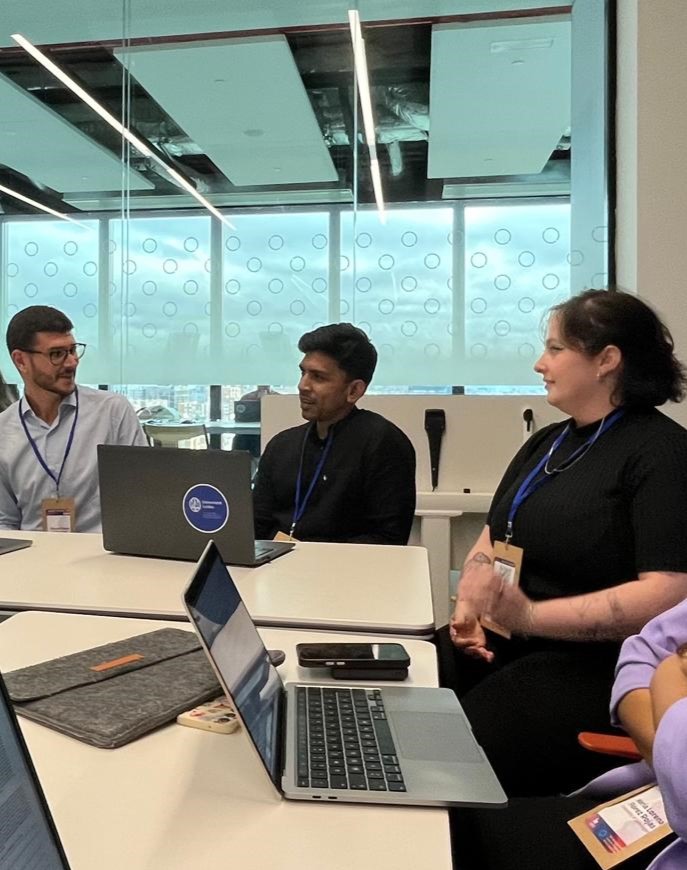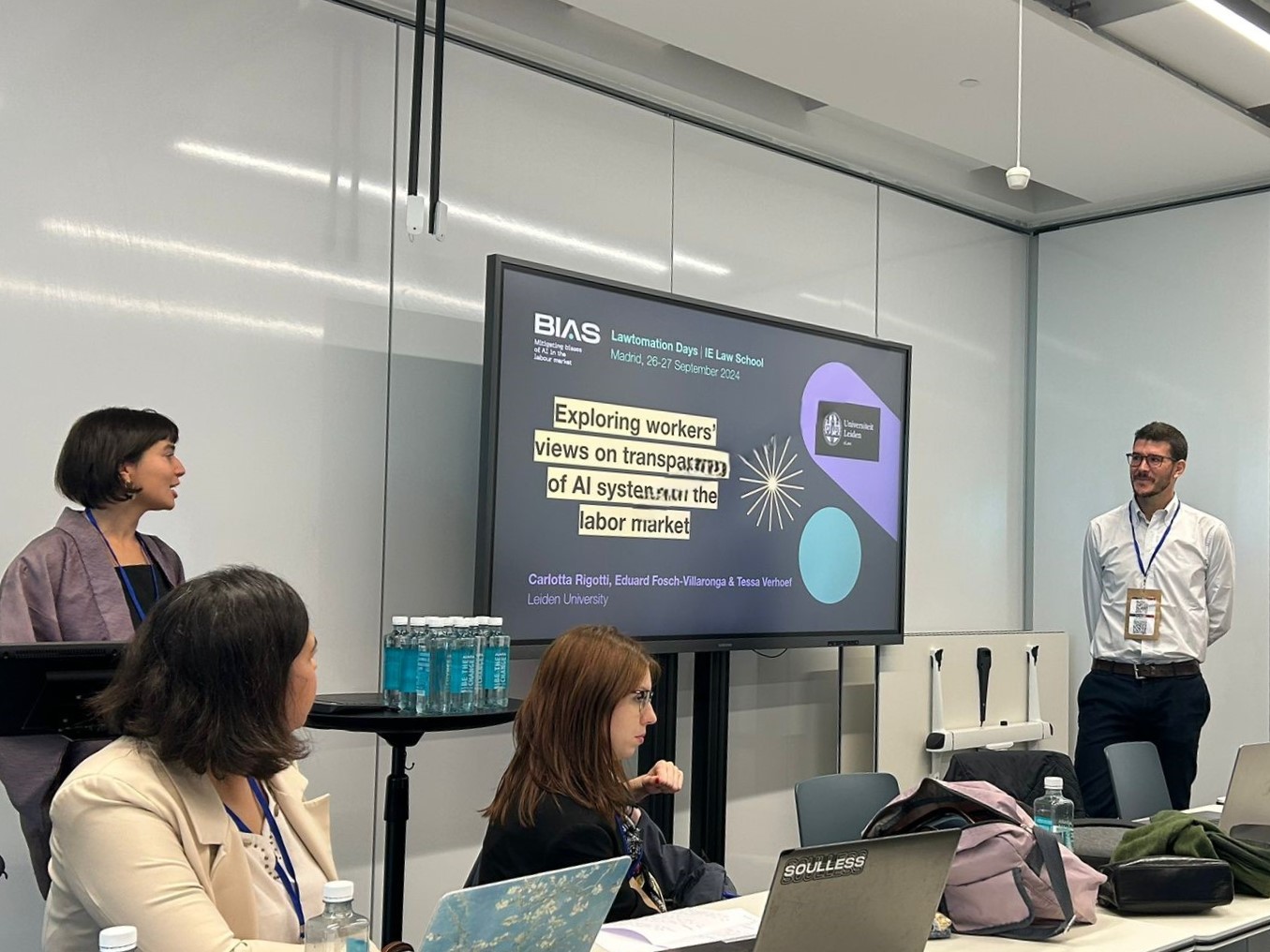eLaw participates in Lawtomation Days 2024
On 26 and 27 September, Eduard Fosch-Villaronga, Carlotta Rigotti, Mohammed Raiz Shaffique, Marie Schwed-Shenker and Antoni Mut Piña participated in the third edition of Lawtomation Days at the IE University in Madrid.
Lawtomation Days ‘24
This year's Lawtomation Days focused on the transformative potential of digital ecosystems, emphasising how technological advancements could foster more sustainable, inclusive and ethically grounded environments. It encouraged cross-disciplinary research and aimed to create a platform for insightful discussions to advance the research agenda.

The conference addressed how law could facilitate automation across various fields, including consumer, criminal, labour, public, private and trade law. It also evaluated the regulatory and legislative measures governing the digital landscape, such as the AI Act and the Digital Services Act. The goal was to provide a realistic perspective on the current legal frameworks, highlighting their effectiveness, shortcomings and opportunities for improvement in response to the prevailing hype and alarmism in the digital and AI realm.
The BIAS project presentation: a focus on AI transparency in the workplace
At the Lawtomation Days, Carlotta and Eduard, alongside co-author Tessa Verhoef, presented their working paper on workers' views and attitudes towards AI transparency in the workplace. Their presentation highlighted the essential role of transparency in both traditional and AI-driven working environments; a priority reflected in the recently adopted Regulation (EU) 2024/1689 (AI Act). Under the AI Act, AI systems used in human resources (HR) are classified as high-risk, though their classification can vary based on specific use cases.

In particular, Eduard emphasised how transparency in AI-driven workplaces is often mistaken for mere information disclosure. However, he also stressed that for transparency to be effective, the information must be meaningful, accessible and relevant to workers. This poses a challenge as AI systems are frequently characterised by opacity, which makes it difficult for employees to fully understand how these systems function and make decisions.The focus of the presentation then shifted to a pioneering study conducted as part of the Horizon Europe BIAS project, which examined survey responses from 4,913 participants across the EU, Iceland, Norway, Switzerland and Turkey. Carlotta presented descriptive and preliminary findings on the experiences of workers and job applicants with AI transparency in the workplace. The insights revealed a modest awareness gap regarding how AI systems operate, offering early recommendations to help ensure compliance with the transparency requirements of the AI Act that will take effect in 2026.
Interested in getting involved in the BIAS project? Click this link to join our pool of national stakeholders.
The BIAS project has received funding from the European Union's Horizon Europe programme under the open call HORIZON-CL4-2021-HUMAN-01-24 - Tackling gender, race and other biases in AI (RIA) (grant agreement No. 101070468)
ERC Safe & Sound Project: Science for Robot Policy
In a panel discussion on technology governance within the EU, members of the Safe & Sound team (Eduard (Principal Investigator) and Marie and Raiz (PhD Candidates)) presented their draft working paper on Science for Robot Policy in the EU. The presentation highlighted how the evidence-based decision making regime in the EU strived to use scientific knowledge to guide regulatory processes and how this approach is also essential in the sphere of service robotics.
The Safe & Sound team also engaged in an interactive discussion with participants on how they conceptualised robots and the associated safety issues. Eduard portrayed how the Safe & Sound project aims to use objective evidence to assist policymaking for service robotics so as to enhance user safety and regulatory compliances for these robots. Raiz and Marie also discussed their case studies for their PhD research projects, which focus on physical assistant robots and socially assistive robots respectively. The team also welcomed Antoni Mut Piña as a new member of the project.
The Safe & Sound project is funded by the European Union’s Horizon ERC programme, Grant Agreement No. 101076929.
Methods in law and technology panel
Eduard Fosch-Villaronga presented his work on ‘Communication structures for knowledge brokerage in robotics policy research’ during the Methods in law and technology panel organised by Kostina Prifti (Erasmus University Rotterdam). The aim of this panel was to initiate a discussion on inter-disciplinarity and cross-disciplinarity in law and technology research. This research field is often characterised by a variety of methods and approaches ranging from socio-legal, law and philosophy, law and computer science to law and environment.
First of all, the panel discussed the challenges that researchers face when they conduct inter-disciplinary and cross-disciplinary research in law and technology, outlining the lessons learned from these experiences. Secondly, the panel shed light on some of the key insights that would help structure methodology guidelines for researchers in law and technology. Eduard also discussed the importance of creating communication structures for knowledge brokerage between developers, policymakers, academia and societal stakeholders for robotic policy.




